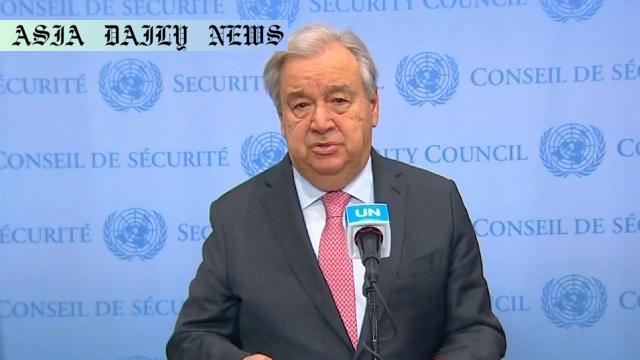Funding Cuts – Severe US reductions in funding could disrupt vital humanitarian and development aid programs globally.
Possible US cuts in funding to UN agencies raise deep concerns.
Critical programs such as humanitarian aid and disease control are at risk.
UN Secretary-General calls for reversing this decision.
Gaza proposals and adherence to international law are emphasized.

Impact of US Funding Cuts on Global Humanitarian Aid
The potential cuts in funding from the United States to the United Nations and various non-governmental organizations (NGOs) is causing great alarm among global leaders. According to recent statements from UN Secretary-General Antonio Guterres, these reductions could have far-reaching consequences, not only on humanitarian and development programs but also on essential initiatives like fighting terrorism and curbing illicit drug trafficking. Such policies, if implemented, threaten to make the global landscape less stable, less secure, and less progressive.
With the US being one of the largest contributors to the United Nations, this move, if realized, will severely hurt ongoing operations that aim to save lives, improve global health, and foster international peace. Programs aimed at controlling outbreaks of infectious diseases like AIDS, distributing food and medical aid to war-torn areas, and initiatives to counter terrorism globally would be the immediate casualties. Guterres’ comments underscore the vital role that international cooperation and funding play in building a safer and healthier world.
The Significance of Maintaining U.S. Financial Contributions
The United States has long been an important financial supporter of global humanitarian efforts, often stepping forward as a leader in the international community. However, these proposed funding cuts could reduce its clout and reliability as a global partner on critical issues. Guterres emphasized that lessened U.S. involvement would not only bring harm to international structures but also may work against America’s own strategic interests in maintaining its influence abroad.
He highlighted reinforced efforts to persuade decision-makers in Washington to reconsider, particularly in light of the interconnectedness of modern challenges. A reduced American presence could pave the way for more instability worldwide, as economies, governments, and societies worldwide struggle to fill the void left by diminished oversight and resources.
The Case of Gaza: A Spotlight on International Law
Additionally, the Secretary-General addressed the issue of the Gaza Strip in response to statements made by U.S. President Donald Trump. The claim that America could “own Gaza for the long term” and the subsequent suggestion of relocating its residents has added another layer of complexity to the discussions. Guterres rejected any form of forced transfer of Gaza’s population, reiterating that such measures would go against the tenets of international law and the basic principles of human rights.
The situation in Gaza, he stressed, requires a multi-pronged approach aimed at recovery, reconstruction, and stability. This entails strict adherence to international frameworks, ensuring that no unilateral or coercive measures take precedence over humane and cooperative interventions. Any such action, if pursued unilaterally or outside the bounds of lawful and respect-based methods, could destabilize the region further, causing undue suffering and straining the global humanitarian system.
A Plea for Reconsideration and a Warning of Global Ramifications
Guterres’ remarks serve not just as a warning but as a plea to maintain momentum in funding critical aid programs globally. He said the ripple effects of reduced U.S. financial support could reverberate across nations, undermining years of progress. Humanitarian crises will only escalate without coordinated international support, and programs aimed at combating pressing issues may ultimately falter under insufficient resources.
The Secretary-General has continued to echo the sentiment that “a less healthy, less prosperous world” is not in the interest of any country, let alone one with America’s capacity to lead on matters of global importance. His calls for a reconsideration are not just about urging continuity—they are about emphasizing the interdependence of global systems and the ethical duty of nations to aid the world’s most vulnerable populations.



Commentary
Understanding the Consequences of Funding Cuts
The United States often emerges as a crucial pillar when it comes to funding global humanitarian and development initiatives. However, the recent conversations surrounding significant cuts to these contributions raise a pressing concern not only for UN agencies and NGOs but also for the global collective well-being. The decision, if undertaken, will undoubtedly jeopardize ongoing projects, many of which serve as lifelines for millions affected by crises worldwide.
Balancing National Interests and Global Responsibilities
The argument for reducing aid often comes from a place of attempting to prioritize domestic interests over international engagements. While such goals may appear justifiable at first glance, the interconnectedness of today’s world reminds us that pulling back can result in larger global issues that eventually spill over into domestic spheres. Diseases do not recognize borders, and conflicts have far-reaching impacts on global economies and geopolitics. Thus, maintaining a leadership role in aiding vulnerable populations is not just a moral imperative but also a strategic investment for nations like the United States.
Effect on Vulnerable Populations
Perhaps the most devastating consequence of these cuts would be felt by the most at-risk populations. Programs fighting infectious diseases like AIDS, hunger relief initiatives, and efforts to stabilize conflict zones will face potential interruptions. This abandonment of globally inclusive policies not only undermines the principles of humanity but also risks stalling progress made over decades of collective action.
A Collaborative Path Forward
It is critical for global leaders and policymakers to come together and collaborate on finding a balanced solution. As Secretary-General Guterres aptly stated, the retreat of American influence in humanitarian concerns would go against its broader global interests. Such funding cuts should spark a larger discourse, uniting nations under the shared responsibility of ensuring equitable, healthy, and sustainable futures for all. The power of partnerships in addressing global challenges cannot be underestimated. The road ahead demands cooperation, empathy, and decisive action if we are to maintain an inclusive and secure global environment.